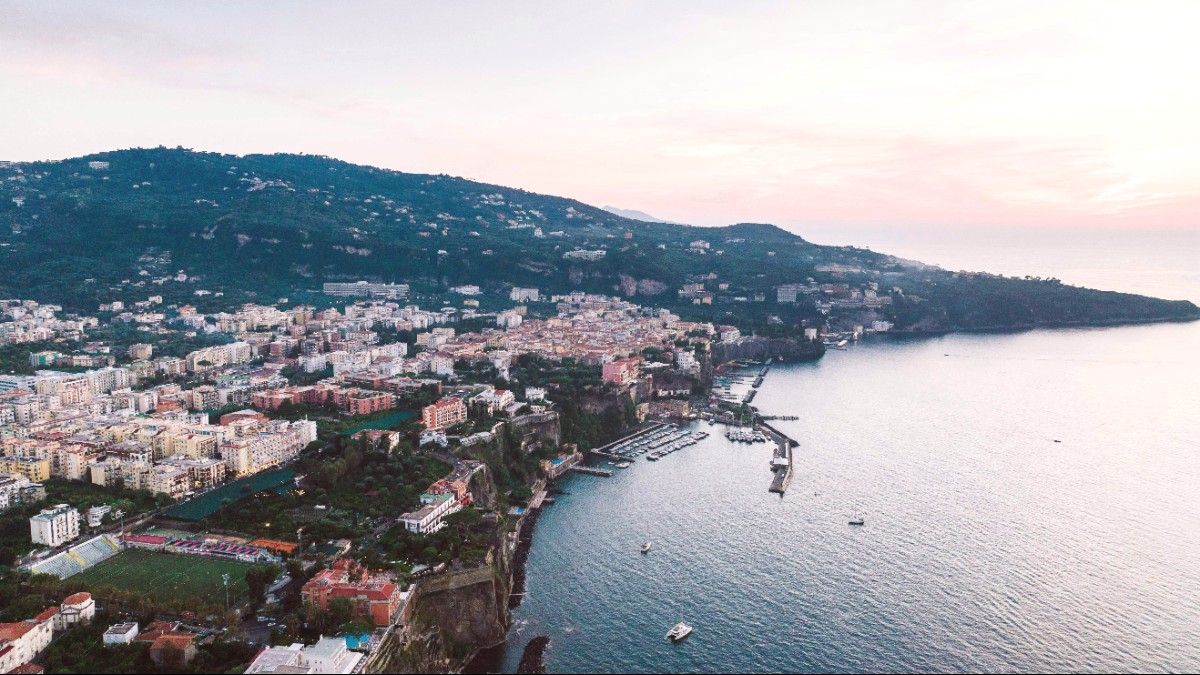
Campania, Italy
Sorrento experiences pleasant temperatures in spring (15-25°C) and autumn (18-28°C), with moderate rainfall. Summers (25-35°C) bring heat and sun, minimal rain, and high humidity. Winters (8-15°C) are cool and damp, with the highest rainfall.
Heatwaves can occur in summer, sometimes exceeding 35°C. Winter rain can be heavy, leading to temporary road closures. Plan activities based on seasonal conditions.
The warmest weather is ideal for beaches and boat trips. All services operate fully. Long daylight hours make for extended exploration.
Expect crowds and long queues. Peak prices for everything. Intense heat possible, making daytime sightseeing uncomfortable.
Spring and Autumn offer comfortable temperatures and clear skies for hiking.
Summer heat can make strenuous walks challenging.
May-September provides the best sea conditions, frequent ferry services, and warmer waters.
Ferry services are limited in winter months.
Shoulder seasons avoid extreme summer heat and large crowds.
Summers see extensive crowds and uncomfortable heat at archaeological sites.
The fewest crowds, presenting a quiet and authentic local experience.
Prices for accommodation and flights reach their lowest during winter months.
Explore without the summer throngs of people.
The winter light can be beautiful.
Fewer tourists lead to more authentic local interactions.
Reduced ferry services and some hotels/restaurants may close.
Heavy rain may lead to temporary coastal road closures.
Italy is part of the Schengen Area; rules vary by nationality.
Citizens of many countries enjoy visa-free entry to Italy and the Schengen Area for up to 90 days within any 180-day period.
Starting in 2025, non-EU citizens with current visa-free travel will need ETIAS authorization before their trip.
No general entry fees apply for tourism into Italy or the Schengen Area.
Effective budgeting frames your Sorrento experience without financial stress. Costs vary significantly based on your travel style.
This budget focuses on minimizing expenses while experiencing local culture.
Accommodation: €25-€40 (hostel dorm, basic guesthouse)
Meals: €20-€35 (pizza slice, panini, supermarket groceries)
This budget permits more comfort and a broader range of experiences.
Accommodation: €70-€120 (3-star hotel, comfortable B&B)
Meals: €40-€70 (more frequent sit-down meals, house wine)
This budget covers premium experiences and maximum comfort.
Accommodation: €150+ (4-5 star hotel, often with sea views)
Meals: €80+ (fine dining experiences, multi-course meals, cocktails)
| Category | Item | Price Range |
|---|---|---|
| Accommodation | Hostel dorm | €25-€50 |
| Meals | Casual lunch (pizza, panini) | €10-€20 |
| Attractions | Pompeii entry | €22 |
Sorrento is a safe destination; awareness and preparation are beneficial.
Routine vaccinations should be up-to-date (MMR, DTP, Polio, flu shots).
Consult a doctor 4-6 weeks before your trip for personalized advice and recommended travel vaccinations.
Practice good personal hygiene and food safety during your trip.
Be mindful of sun, heat, and walking-related issues.
Summer brings sunburn and heatstroke risk. Use high SPF sunscreen, wear hats and sunglasses. Stay hydrated by drinking plenty of water.
Traveler's diarrhea risk is low; eat at reputable establishments. Mosquitoes are present, especially in the evenings; use insect repellent.
Wear comfortable, broken-in shoes for walking to prevent blisters and foot pain.
Common European emergency number for police, ambulance, fire.
Known as "Farmacia," identifiable by a green cross sign. Pharmacists offer advice for minor ailments.
Local hospital is Ospedale Civile di Sorrento. Private clinics often offer faster service.
Sorrento has a low crime rate and is very safe for tourists. Petty crime, like pickpocketing, can occur in crowded areas.
Italy is in a seismic zone. Monitor local warnings and civil protection advisories.
Minor tremors can occur. Familiarize yourself with basic earthquake safety (drop, cover, hold on).
Mount Vesuvius is an active volcano, but it is closely monitored. Emergency plans are in place for the wider Naples area.
Heavy rainfall, especially in autumn and winter, can cause landslides on steep coastal roads. Roads may close temporarily for safety.
General Emergency: 112 (Police, Ambulance, Fire)
Police (Carabinieri/Polizia): 112 or 113
Ambulance (Emergenza Sanitaria): 118
Fire Department (Vigili del Fuoco): 115
Your Country's Embassy/Consulate in Rome or Naples.
Program these numbers into your phone and carry a physical copy.